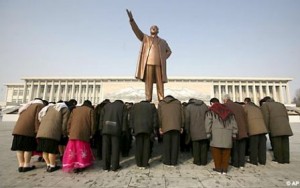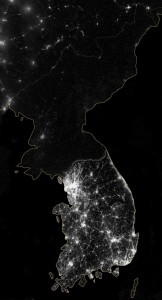I’ve spent the last few days at a conference in South Korea, at somewhere called Paju Book City, yes a whole city (well, more like a town) devoted to books. Paju is a few miles from the North Korean border, so visitors at the conference got the opportunity to travel up there and peer over the border, just as North Korea celebrated its 70th birthday with a big military parade.
We didn’t see much, but it brought home the strange reality of this situation, where a country was abritrarily divided overnight by the US state departent, separating families and loved ones and consigning them to completely different fates. North Korea has barely any electricity, is the only country in the world without internet, 43% of the children born there in the 1990s are shrunken from malnutrition, and it has one of the most brutal and repressive regimes in the world – you can be executed merely for making a joke about the Glorious Leader. Meanwhile, South Korea has boomed into one of the ten biggest economies in the world, a fun-loving and hedonist young democracy, with the highest global percentage of homes with broadband, streets jammed with Hyundais, and the Noreabang bars blaring with K-Pop.
The border visit prompted me to read Nothing To Envy: Real Lives in North Korea, an account of life inside North Korea written by American journalist Barbara Demick. The material, skilfully weaved together into themes and stories, is made up of interviews she’s done with various people who defected. She follows a handful of stories – a student, a street-vagrant, a doctor, a housewife – as they go through the hopeful early years when North Korea outpaced the South, people’s lives, loves, work, dreams, the fall of the USSR, the awful mid-90s famine, the traumatic death of ‘our father’ Kim Il-Sung in 1994, the subsequent brutal crackdown by Kim Jong-Il, the dawning realisation that North Korea wasn’t the leading country in the world, and finally the interviewees’ disillusion with the regime, decision to defect, and daring escapes.
 It’s the reaction to Kim Il-Sung’s death that really struck me. The Glorious Leader had built up a religious cult around himself – children were given candy on his birthday, every house had his photograph and would say thank you to it – so when he died, it was like God dying. Here’s Demick’s account of the reaction in Chongjin, a big regional city:
It’s the reaction to Kim Il-Sung’s death that really struck me. The Glorious Leader had built up a religious cult around himself – children were given candy on his birthday, every house had his photograph and would say thank you to it – so when he died, it was like God dying. Here’s Demick’s account of the reaction in Chongjin, a big regional city:
People didn’t want to be alone with their grief. They burst out of their homes and ran towards the statues [there are 34,000 statues of the Great Leader in the country] which were in fact the spiritual centres of each city…People started to surge forward, knocking down those in line…’Abogi, Abogi’, the old women wailed, the Korean honorific used to address either one’s father or God. ‘How could you leave us so suddenly?’ the men screamed in turn.
Those waiting in line would jump up and down, pound their heads, collapse into theatrical swoons, rip their clothes, and shake their fists at the air in futile rage. The men wept as copiously as the women. The histrionics of grief took on a competitive quality. Who could weep the loudest? Who was the most distraught? The mourners were egged on by the TN news, which broadcast hours and hours of people wailing, banging their heads on trees, pilots weeping in cockpits, and so on.
Many older North Koreans suffered heart attacks and strokes during the period of mourning. Others showed their distress by killing themselves.
But was all the grief real? For some, certainly. Others may have just used the occasion as an opportunity to let out the emotion and exhuastion of several years of hardship, famine and tragedy. And some had to fake it to avoid suspicion. One such was Jun-Sang, a young student in Pyongyang, who would later defect. We read:
Nobody knew quite what to do [when they were told the Great Leader was dead]. So one by one each of the three thousand students sat down on the hot pavement, head in hand. Jun-Sang sat down, too, unsure of what else to do. Keeping his head down so nobody could read the confusion on his face. He stole glances at his grief-stricken classmates. He found it curious that he wasn’t crying…What was wrong with him? Why wasn’t he sad that Kim Il-Sung was dead? Didn’t he love Kim Il-Sung? He wondered: if everybody else felt such genuine love for Kim Il-sung and he did not, how would he possibly fit in?…That revelation was quickly followed by another, equally momentous: his entire future depended on his ability to cry. Not just his career and his membership in the Worker’s Party, his very survival was at stake.
And then, 17 years later, Kim Il-Sung’s son, Kim Jong-Il, died too. This time the reaction was broadcast around the world. Probably by that time a higher percentage were faking it. Demick asked a recent defector how many people were ‘true believers’ these days. ‘Zero’, she answered firmly. ‘It’s not belief in the system that keeps us going. It is belief in life.’ I hope the situation for North Koreans improves soon.

